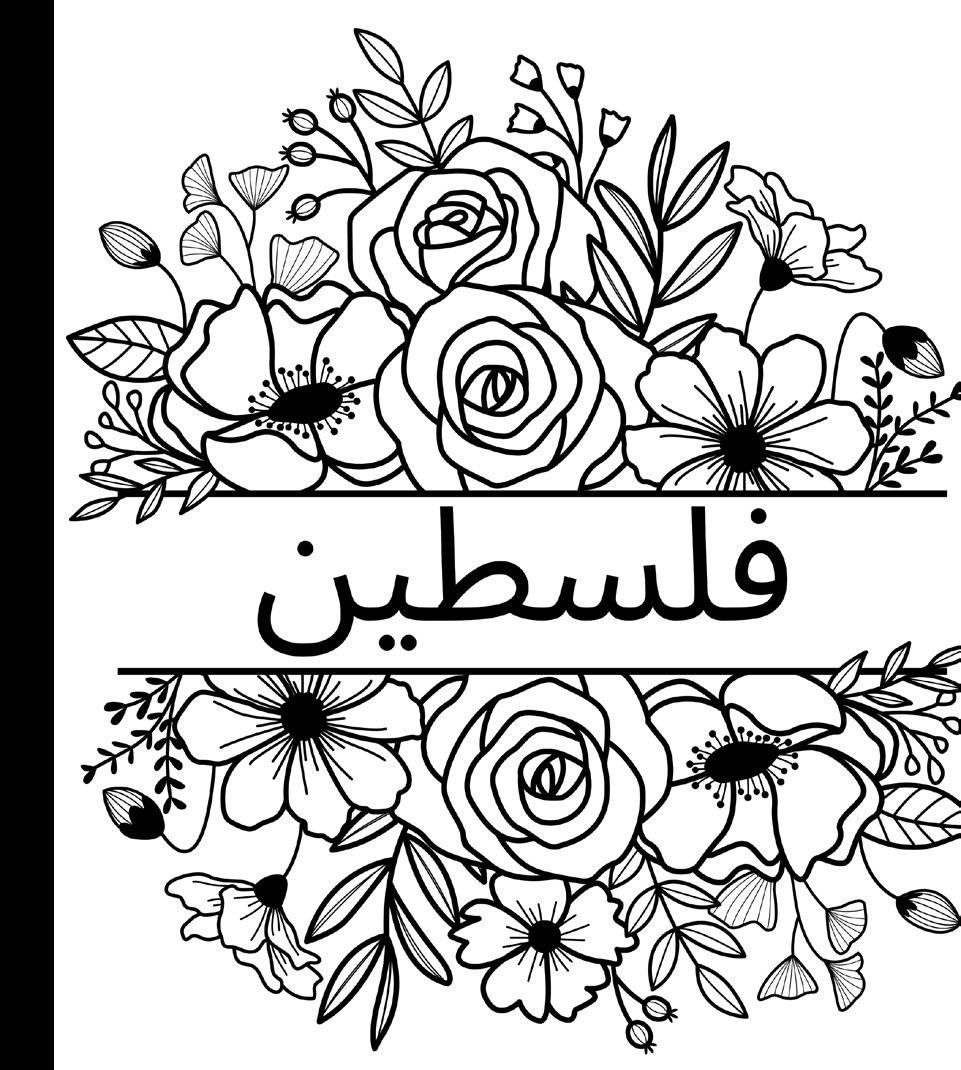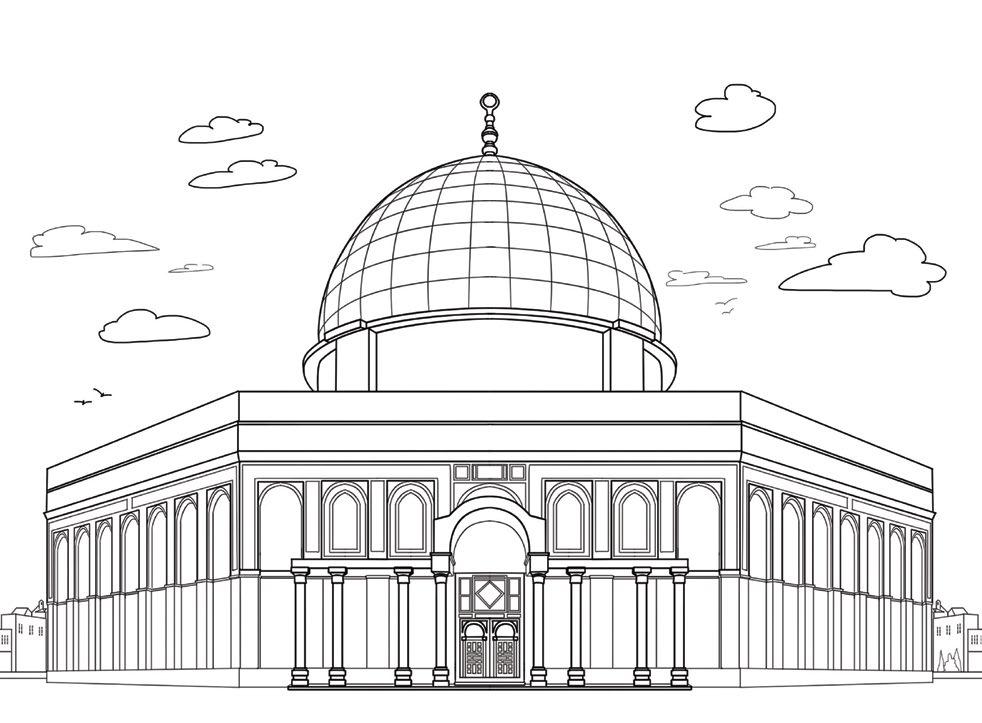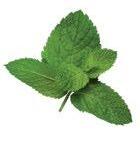

TOP ARTICLE
BEAUTIFUL PATIENCE with trials



TOP ARTICLE
BEAUTIFUL PATIENCE with trials

Palestine in a Dish
ARTICLES: TRIALS & TRIBULATIONS THE WISDOM OF TRIALS POSITIVE IN HARD TIMES RECIPE CORNER

Creative Director
Umar Mohammed
Editor
Kerina Mohammed
Editorial Team
Rochelle Flores
Jehan Ali
Photography Waaw Media shutterstock.com
Art & Layout Waaw Media
Contributing Partners
Waaw Media
Productive Muslim My Deen
Contributors
Kerina Mohammed
Rochelle Flores
Jehan Ali
Waleeyah
Afeefa Ali Abu Amina Elias
Contact Us
Interested in advertising call +868-776-9229
Interested in writing call +868-487-0797
umar@waawmedia.com kerina@waawmedia.com
To see more articles, recipes and activities visit us at: www.ihsaanmag.com
To view our digital copy go to: www.ihsaanmag.com
Check us out on social media: @ihsaanmag



“One Ummah.....”


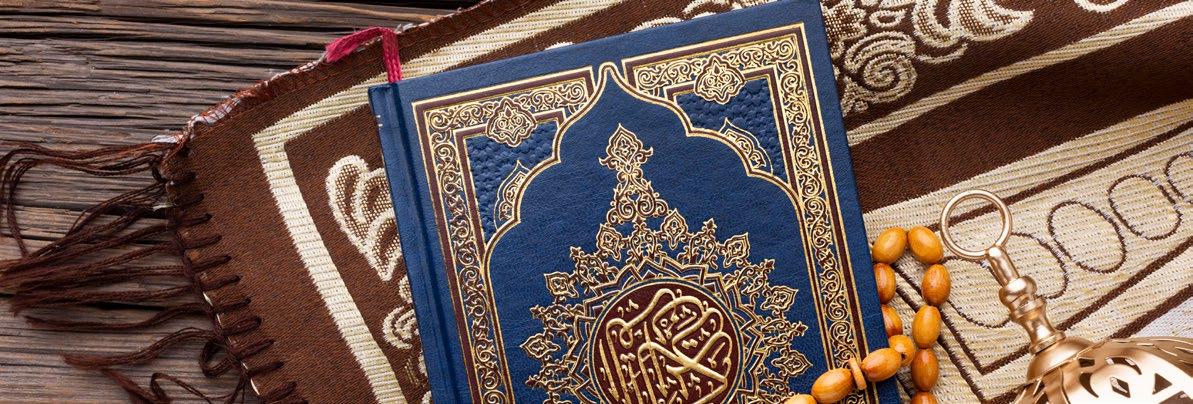
• Over 400 cities around the world and counting
• A Quran learner gets 10 good deeds for each letter for the rest of their lives as they study. You can have a share of that!
• The prophet (S) said the one who facilitates the way to good is like the one doing it!
• Be part of the unprecedented global movement of giving hearts and minds access to the Quran!
• Our goal is to reach hundreds of millions of learners and we will get there together!
SUPPORT A QURAN LEARNER FOR A YEAR FOR $112
This is not an official Bayyinah TV Ad. This ad was created by a Bayyinah Dream Student in hopes of getting as much support for those studying and hoping to study Quran. Please see official Bayyinah FB Page for further details.

THE POWER OF FAITH IN THE FACE OF OPPRESSION
We live in a time that is marked by wars, evil and corruption, where the rights to simply live is being taken away without regard and without remorse. We live in a time where the world is no longer filled with peace and safety, but rather with the fear that the world as we know it will soon come to an end, as we witness wars upon wars all over the world. For anybody who is anybody, who follows the changes taking place in the global community, one particular current event stands out and is taking precedence in drawing the attention of the world –
For anyone with a social media account, be it Facebook or Instagram, the bombardment and killing of thousands of innocent civilians of Gaza – men, women and especially children- have filled the screens, showing in real-time the onslaught of a particular regime upon a population who for the last 75 years have endured oppression. As the world looks on in helpless horror at the daily surmounting atrocities upon the Palestinians, we often wonder and question ‘Why?’. Why is this happening and why is it being allowed to happen?
For the past 4 months +, the world has witnessed the genocide of the Palestinian people by the occupying forces, yet all we can do is simply sit at home and watch it unfold behind our electronic devices. People, in their millions around the world, have tried their best to send a message to those in authority, by boycotting, protesting, making dua, sending aid relief, yet it feels like nothing is working. Many ask themselves ‘Why? Why won’t this stop?’. However, if we take a step back, and look at the bigger picture, we see things happening in the world that has only begun to happen due to what is being witnessed throughout this genocide.
For the first time in as long as we can remember, the words Muslim and Islam are being seen as something other than what has been portrayed by the western media for decades. The dehumanization of Muslims, the vilification of Islam and the Qur’an are being seen for what it truly is, and the unveiling of those behind the negative portrayal of Islam and Muslims are being witnessed the world over. We are seeing people who did not know about Islam before, or who were fed lies all their lives, come to the realization that things were not as they thought they were. The eyes of millions of people have been opened to the truth of Islam and this is as a result of the genocide and the response and resilience of the Palestinian people.
The oft repeated statement by the Palestinians ‘Hasbunallah wa Ni’amal Wakeel’, gives the rest of the world hope and shows their true nature, that they truly believe in Allah and His decree of the way their lives unfold. Their absolute submission to His Will, and their utterances of Alhamdulillah in all circumstances is something never before witnessed by the masses. Allah says in the Qur’an,
“Thosetowhompeople[i.e.,the hypocrites]said,“Indeed,thepeoplehave gatheredagainstyou,sofearthem.”But itmerelyincreasedtheminfaith,andthey said,“SufficientforusisAllah,and[Heis] thebestDisposerofaffairs.”[Hasbunallah waNi’amalWakeel]
{SurahAli-Imraan3:173}
As the days, the weeks and the months go by, and we continue to witness the genocide in Palestine, we see so many non-Muslims being intrigued, fascinated and inspired by how the Palestinian people –particularly the Muslims of Palestine – are dealing with what is happening to them. The strength, the resilience, the immense patience and acceptance of Allah’s Decree on them, have caused many nonMuslims to look into Islam and particularly what the Qur’an speaks about. This turn of events has not only caused many people worldwide to simply look into Islam, but to revert to Islam as well! Millions of people have got their hands on their first copy of the Qur’an and for the first time in their lives, have read what Allah has said, and not what the western, propaganda media personalities have said was in the Qur’an. On the other hand, Millions more Muslims have had their Imaan strengthened and uplifted upon seeing the suffering of their brothers and sisters in Palestine. The Ummah as we know it is seeing what it means to feel the pain and suffering of their fellow brethren in Islam.
For the first time, the lies and the false accusations about Islam and Muslims have come to light and we see so many people falling in love with Islam and its beautiful teachings. We see millions of people see Muslims for who they really are, the humble, kind, patient, forbearing, loving souls who wish for nothing but Allah’s Pleasure. For the first time in as long as we can remember, Islam and Muslims are heard! For decades, Muslims have fought against Islamophobia, hatred, demoralisation, ignorance and the list goes on, yet what is happening in Palestine have caused a wave of truth to now wash over the majority world as we know it.
When we ask ourselves ‘Why?’, understand that Allah’s Plans are ALWAYS better than our plans and what we perceive as good and bad. Always remember and understand and accept with full acceptance and resolve, just as the Palestinians do, that Allah says in the Qur’an,
“Itcouldbethatyoudislikesomething, whenitisgoodforyou;anditcouldbethat youlikesomethingwhenitisbadforyou. Allahknows,andyoudonotknow.”
[SurahAlBaqarah2:216}



TRIALS AND TRIBULATIONS ARE AN UNDENIABLE PART OF THIS WORLDLY LIFE. WHAT CONSTITUTES A TRIAL OR TRIBULATION DIFFERS FROM PERSON TO PERSON, YET EVERY PERSON IS BEING TESTED IN SOME FORM OR MANY FORMS–BE IT THROUGH EASE OR THROUGH HARDSHIP, IN MATTERS OF HEALTH, RELATIONSHIPS, WEALTH, AND MORE.
People who came before us were also tested–not sparing neither the pious nor the powerful. Many of the most beloved people to Allah went through various types of major tests. They serve as a reminder for all of us–to appreciate how they withstood those trials and how perseverance pays off.
It was narrated from Mus’ab bin Sa’d that his father Sa’d bin Abu Waqqas said, “I said: ‘O Messenger of Allah, which people are most severely tested?’ He said, ‘The prophets, then the next best and the next best. A person is tested according to his religious commitment. If he is steadfast in his religious commitment, he will be tested more severely, and if he is frail in his religious commitment, his test will be according to his commitment. Trials will continue to afflict a person until they leave him walking on the earth with no sin on him.’” [Ibn Majah]
Why We Experience Trials
A common misconception is that trials or hardships are punishment for our mistakes or are delivered in proportion to our mistakes. Hardships are guaranteed as Allah says: “Wehavecertainly created man into hardship.”[Qur’an; 90:4]
And may have no relevance with our mistakes but instead they may be presented as an opportunity to scale the obstacle and reach something better on the other side. Trials can be a sign that Allah (Glorified and Exalted be He) intends good for us, because through trials our sins are expiated and we have the opportunity to perform good deeds. Trials and tribulations are thereby a means of purification and earning nearness to Allah (Glorified and Exalted be He).
Crude oil is refined before it can be used. Gold and diamonds go through a rigorous process of purification before they reach their potential. Likewise, we must go through a spiritual purification process.
Some tribulations make us appreciate what we never appreciated before while others teach us something which protects us from bigger issues in the future. Temporary trials may appear as a reminder of the blessings that we have taken for granted. Illness makes us appreciative of health and prompts us to use our healthy days productively. Missing someone makes us appreciate that relationship and value it more when reunited. Being inconvenienced through travel and unfamiliar surroundings makes us appreciate stability and security.
hastens his punishment in the world. And when He wants bad for His slave, He withholds his sins from him until he appears before Him on the Day of Judgement.”
[Tirmidhi]
Some trials are an expiation for sins that we may have forgotten about or neglected to repent from while others are an opportunity to strengthen our character and endurance
“Allahdoesnotcharge asoulexcept[withthat within]itscapacity…” [Qur’an;2:286]
Through our trials and tribulations we not only come to recognize our own mettle but also the true quality of the people around us. We get the opportunity to distinguish between our true supporters and wolves in sheep’s clothing. In some cases, enduring a trial is a barter for something better in the hereafter.
“Allahsaid,‘IfIdeprive myslaveofhistwo belovedthings(i.e.,his eyes)andheremains patient,Iwilllethim enter Paradise in compensationfor them.’”[Bukhari]
“No calamity befalls a Muslim but that Allah expiates some of his sins because of it, even though it were the prick he receives from a thorn.” [Sahih Bukhari]
“When Allah wants good for his slave, He

“This people of mine is one to which mercy is shown. It will have no punishment in the next world, but its punishment in this world will be trials, earthquakes and being killed.” [Abu Dawud]
“If Allah wants to do good to somebody, He afflicts him with trials.” [Bukhari]
“When Allah wants good for his slave, He hastens his punishment in the world. And when He wants bad for His slave, He withholds his sins from him until he appears before Him on the Day of Judgement.” [Tirmidhi]
“Indeed greater reward comes with greater trial. And indeed, when Allah loves a people He subjects them to trials, so whoever is content, then for him is pleasure, and whoever is discontent, then for him is wrath.” [Tirmidhi]
“When a slave’s child dies, Allah the Most High asks His angels, ‘Have you taken out
And will provide for him from where he does not expect. And whoever relies upon Allah – then He is sufficient for him. Indeed, Allah will accomplish His purpose.


the life of the child of My slave?” They reply in the affirmative. He then asks, ‘Have you taken the fruit of his heart?’ They reply in the affirmative. Thereupon he asks, ‘What has My slave said?’ They say: ‘He has praised You and said: Inna lillahi wa inna ilaihi raji’un (We belong to Allah and to Him we shall be returned). Allah says: ‘Build a house for My slave in Jannah and name it as Bait-ul-Hamd (the House of Praise).”‘ [Tirmidhi]
Allah (Glorified and Exalted be He) says, “My faithful servant’s reward from Me, if I have taken to Me his best friend from amongst the inhabitants of the world and he has then borne it patiently for My sake, shall be nothing less than Paradise.” [Hadith Qudsi]
Therefore our efforts should be not to avoid the test, but rather to succeed through it and earn the pleasure of Allah (Glorified and Exalted be He). Being tested is part of the plan rather than an anomaly.
created death and lifetotestyou[asto] whichofyouisbestin deed–andHeisthe ExaltedinMight,the Forgiving.”[Qur’an; 67:1-2]
“Or do you think that you will enter Paradise while such [trial] has not yet come to you as came to those who passed on before you? They were touched by poverty and hardship and were shaken until [even their] messenger and those who believed with him said, “When is the help of Allah?” Unquestionably, the help of Allah is near.” [Qur’an; 2:214]
Hereafter).” [Bukhari]
“BlessedisHeinwhose handisdominion,and Heisoverallthings competent–[He]who
“AndWewillsurelytest youwithsomething offearandhunger andalossofwealth andlivesandfruits, butgivegoodtidings tothepatient,Who, when disaster strikes them,say,“Indeedwe belongtoAllah,and indeedtoHimwewill return.”Those are the onesuponwhomare blessingsfromtheir Lordandmercy.And it is those who are the[rightly]guided.”
[Qur’an;2:155-157]
“We have certainly created man into hardship.” [Qur’an; 90:4]
There is no need to find people or sources to blame. Even in the face of oppression–be it small or great–we must remember not to allow our suffering to trigger us into committing further acts of injustice or oppression. “Whoever has wronged his brother, should ask for his pardon (before his death), as (in the Hereafter) there will be neither a Dinar nor a Dirham. (He should secure pardon in this life) before some of his good deeds are taken and paid to his brother, or if he has done no good deeds, some of the bad deeds
“O you who have believed, be persistently standing firm for Allah, witnesses in justice, and do not let the hatred of a people prevent you from being just. Be just; that is nearer to righteousness. And fear Allah; indeed, Allah is Acquainted with what you do.” [Qur’an; 5:8]
As the saying goes, if you are only good to those who are good to you, then what good are you?
Very few things in life are attained without some sort of test and research. Be it buying a car, or seeking knowledge, there has to be some effort coupled with trial and error. These not only test our sincerity in attaining the objective but also help us appreciate the end goal more once we have attained it, because there was some striving involved.
A bigger reflection, however, is that we are limited in our abilities and need Allah (Glorified and Exalted be He) to take care of our affairs, to help us, to forgive us, and have mercy on us.
“How wonderful is the case of a believer; there is good for him in everything and this applies only to a believer. If prosperity attends him, he expresses gratitude to Allah and that is good for him; and if adversity befalls him, he endures it patiently and that is better for him”. [Muslim]
Willpower and patience are muscles that can be trained to push known limits, yet we find they have atrophied from lack of exercise instead. A headache is instantly cured with a pill. Information is at our fingertips whenever we want it. We can seemingly reach anyone anywhere at any time and expect to hear back from them almost immediately. Education (or rather a certificate) can be attained via the fast track. It seems one does not have to work a lifetime to be wealthy but can attain wealth instantly through a “miracle formula”.
It may be that what appears to be a form of misfortune has actually come about as mercy from Allah (Glorified and Exalted be He) in that it forewarns us to check ourselves and take corrective measures so that we do not fall into more serious trouble either in this world or in the hereafter. It may also be that an apparent misfortune actually prevents us from real misfortune. A simple example of this is missing a flight that was destined to crash, but what about calamities that we never see for ourselves but only Allah (Glorified and Exalted be He) knows about? Thus we have to trust His Infinite Wisdom.
Tawakkul
A believer must develop reliance on Allah (Glorified and Exalted be He). This is known as tawakkul. It is to put one’s trust in Allah completely and believe that He alone can ward off harm and He alone can bring benefit. Equipped with tawakkul, a believer is able to accept various turns of events without becoming engulfed in anxiety or sorrow.
“And will provide for him from where he does not expect. And whoever relies upon Allah – then He is sufficient for him. Indeed, Allah will accomplish His purpose. Allah has already set for everything a [decreed] extent.” [Qur’an; 65:3]
Tawakkul is not an excuse for inaction. Rather, it is about striving with one’s best effort while relying on Allah (Glorified and Exalted be He) to take care of one’s affairs and leaving the outcome to Him. There is no worry or anxiety in the process of striving.
A daughter of the Prophet (peace and blessings of Allah be upon him) sent a message to him that her son was at his last breath, and requested him to come to her. The Messenger of Allah (peace and blessings of Allah be upon him) sent back the informer saying, “To Allah belongs what He takes and what He gives, and everything has a limited period (in this world). So ask her to endure patiently, and expect the reward of Allah.” [Al-Bukhari and Muslim] We have become accustomed to instant gratification and thereby patience is in limited supply.

Life, on the other hand, does not always serve our need for instant gratification. It does not always go according to plan. Are we equipped to hustle and struggle? Are we willing to endure until we see the light at the end of the tunnel, or the view after the climb? Do we have tawakkul and persevere or do we complain, blame, and feel like victims? That is a

“…And indeed, when We let man taste mercy from us, he rejoices in it; but if evil afflicts him for what his hands have put forth, then indeed, man is ungrateful.” [Qur’an; 42:48]
“And as for man, when his Lord tries him and [thus] is generous to him and favors him, he says, “My Lord has honored me.” But when He tries him and restricts his provision, he says, “My Lord has humiliated me.” [Qur’an; 89:15-16]
Such is the nature of the human being. Alternating between ease and hardship is in itself a means of turning back to Allah (Glorified and Exalted be He) time and time again.
Suffering, Anguish, Misery
At some point, one may start to wonder why there is so much suffering in the world. At the same time, there are elements out there who try to make people secondguess their faith and ask questions along the lines of, “Would an AllMerciful and All-Powerful God allow
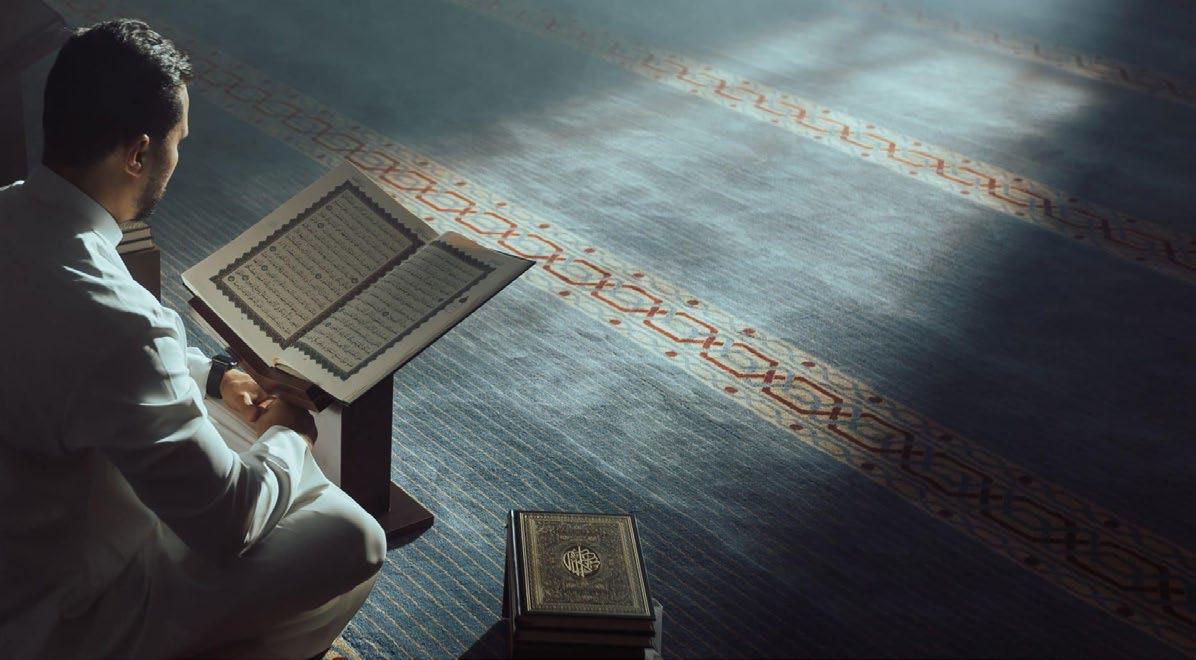
suffering and evil?” This results in youngsters, especially, having their faith shaken as they have not yet attained the maturity or guidance to deal with such elements. It is noteworthy that the angels themselves asked Allah (Glorified and Exalted be He) about placing mankind on Earth:
The irony is that those who mock religion or God (may Allah safeguard us), have not solved any problem but have rather created a new problem. They do not have answers to questions about where mankind came from, what the purpose of life is, how we are supposed to live on Earth, etc. Yet we do have some clarification on the benefits of trials and tribulations.
be rewarded by responding to them with goodness and morality. We use the pain and suffering to earn the mercy of Allah (Glorified and Exalted be He) and eternal well-being.
And [mention, O Muhammad], when your Lord said to the angels, “Indeed, I will make upon the earth a successive authority.” They said, “Will You place upon it one who causes corruption therein and sheds blood, while we declare Your praise and sanctify You?” Allah said, “Indeed, I know that which you do not know.” [Qur’an; 2:30]
The response was not a deep, rational, philosophical rebuttal on every point, but rather a profound statement requiring one to trust Allah (Glorified and Exalted be He) in His infinite knowledge and wisdom behind what He decrees because He knows and we do not.
“Heisnotquestionedabout whatHedoes,buttheywillbe questioned.”[Qur’an;21:23]
Regardless, it is important to understand that this present life is not meant to be the abode of peace; it is the testing ground and abode of trials (Dar-ul-Bala’). The real abode of peace (Dar-us-Salam) is to be found in the Hereafter, by the name of Jannah. Therefore rather than seeking perpetual happiness in this life, we need to focus our efforts on abiding by the commands of Allah (Glorified and Exalted be He) and seeking out Jannah. Thus one of the wisdoms of having pain and suffering in this world is to allow us to pass those tests and
We can simplify this issue by understanding that Allah (Glorified and Exalted be He) is The Most Just. Therefore whatever He decrees has wisdom in it even if we do not perceive it. For example, a caring and loving doctor and father may be forced to amputate the leg of his son. There is no doubt that this father loves his son and that his action was for good reason, although it may seem cruel to those who do not understand the circumstances. Whereas the love of a human being is limited, Allah (Glorified and Exalted be He) is infinite in His mercy and compassion.



Hardship is an inevitable experience in life. Each one of us will encounter pain, loss, fear, anxiety, sadness, and grief at some point in our journey to the Hereafter.
Islam equips us with the spiritual resources to be able to overcome any trial in this world, as long as we maintain trust in Allah’s plan and decree. It is important to draw on these resources whenever we face adversity, such that we respond with the type of ‘beautiful patience’ practiced by Prophet Muhammad and the other prophets before him. The theology of Islam and the contents of its sacred scriptures, the Qur’an and authentic Hadith, contain what psychologists call beneficial cognitions, or thought patterns, that are conducive to a believer’s sound mental health and well-being. These cognitions have even been integrated into psychotherapy and counseling specifically for Muslims.
Islam provides us with a worldview that considers the creation to be a temporal abode of testing, in which Allah puts His servants to trial in order to turn them back to faith when they forget, to expiate their sins, and to bring out the best in them. Everything that happens to a believer in this life is good, even if it appears outwardly bad. If it is a time of prosperity, believers are rewarded for their gratitude, and if it is a time of adversity, believers are rewarded for their patience. The highest level of faith is to respond to
these trials with ‘beautiful patience,’ an unshakeable trust in Allah without hesitation, apprehension, or complaint.
Too often we see suffering in this world beyond what we can comprehend and sometimes endure suffering ourselves. We begin to question everything. How can Allah swt allow this to happen? Why is this happening to me when I have been trying my best to be a good person and dutiful believer? Did I do something wrong for Allah swt to abandon me? You question your selfworth and Allah’s mercy.
Do people think that they will be let go by merely saying: “We believe,” and that they will not be tested? for We indeed tested those before them. Allah will certainly ascertain those who spoke the truth and those who lied. (surah ankabuut)
We must understand that Allah swt has the right to test us how He sees fit and He has His reasons for every trial. None of which is intended to cause us harm in the long run. Whether a situation becomes a test, or a punishment is up to us and how we choose to react to it. Ultimately, He wants Jannah for us, and Jannah isn’t cheap. We must become worthy. We must take a deeper look and ask what is He trying to teach us?
Let’s look at some reasons why He may test us.
• Test of sincerity. When we say Allahu akbar, do we believe that Allah swt is greater than all things? Greater than our desires and every worldly matter? When we say Alhamdulillah, do we truly believe that Allah swt is deserving of all thanks and praise in every condition no matter what? When we say Laa ilaaha illallah, is there really no one or nothing else that has Godly control over us except Allah? Let’s take a lesson from our fellow Palestinians whose adhkaar holds so much more weight because they are experiencing the full brunt of these tests and still able to say them full of hope in Allah’s reward and mercy.
Allah swt has caused the ummah to awaken and an increase in their imaan, people’s hearts are being filled with gratitude and empathy, non-muslims are turning to the Qur’aan

• To develop emotional intelligence. How else will we know how to choose our battles, how to control our anger, how to discipline our emotions and reactions, how to maintain good conduct unless He places us in situations over and over until we learn?
• Sometimes He tests us to bring out the ugly parts of us so that we become aware of them and can fix them. For example, He puts us in a humbling situation to help us see unhealthy pride growing within our hearts.
• Sometimes He gives us an oppressor because He wants us to develop bravery, resilience and learn to stand up for ourselves or He wants to accept our duaas.
• He wants to teach us gratitude. We must

know what sadness is like to appreciate happiness, we must lose some material things to truly see the value of what we have left.
• Sometimes He makes the trial of others a trial for us to test our loyalty. To see whether we will stand as one body and support each other in times of need and in seeking justice.
• He wants to teach us beautiful patience, so He tests us over and over until we go from complaining to tranquility over His Qadr.
• He wants to purify us of our sins. It is His mercy that we face purification here than through the Hell fire to be worthy of Jannah.
• He wants to hear us in duaa repeatedly while increasing our tawakkul and closeness to Him.
• He wants a higher rank in Jannah for us by increasing the level of the challenge.
• He wants to use us for the greater good. The Palestinians are being tested harshly and what is coming out of it? Allah swt has caused the ummah to awaken and an increase in their imaan, people’s hearts are being filled with gratitude and empathy, nonmuslims are turning to the Qur’aan to see where they draw strength from, and many are turning to Islaam altogether. The evil of this world has been exposed.
When the bodies of martyrs are unnamed and have been desecrated in this life, know that they are famous among the angels and the elite of Jannah and honored in the court of Allah.
A Luxurious life is a temporary distraction that often makes us lazy, proud, heedless, wasteful, and extravagant. Far from the life our Nabi s.a.w had. It can make us too comfortable here, diminishing our longing for the hereafter. True luxury lies in a simple life with less to account for when we die.
When we give to the poor it seems as though we are making life easier for them, but we are doing it to save our own selves. Every sacrifice we make in this world,
we build luxury for ourselves in the next. When we starve our body through fasting, we nourish our souls. Not everything is as it seems in this life, remember that and the trials become more manageable.
Don’t play hero. When we try to take matters into our own hands, the struggle can become overwhelming. We cannot overcome Allah’s tests and Shaitaan’s traps without divine help. Allah taught us to seek help with patience and prayer. We ask Him to protect us from our own selves. From the evils and weaknesses within. Sometimes we may also need to speak to someone who can advise and remind. It can be that the very advice we give to others hits differently when we hear it during our own trial
Don’t play victim
Avoid complaining, blaming others, feeling sorry for yourself, becoming hopeless in the help and mercy of Allah swt. Take responsibility to see His lessons, keep developing your character and levelling up your practice of deen while repenting for the slip ups in between. Find comfort and strength from the verses of the Qur’aan as the Palestinians do. May Allah swt make us worthy of jannatul Firdous aaameen

WE CERTAINLY NEED TO BE PATIENT WITH TRIALS AND THE HIGHEST LEVEL OF FAITH IS TO RESPOND WITH ‘BEAUTIFUL
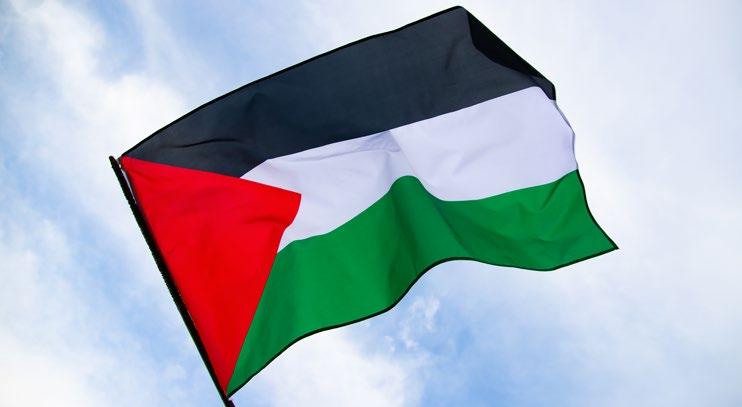
This is the level of the Prophet ﷺ himself and the foremost of the righteous believers. Allah said to him, “So be patient with beautiful patience.”
Qur’an 70:5.
Similarly, the Prophet Jacob said after his sons brought him the false blood-stained shirt of Joseph, “Rather, your souls have enticed you to something, so for me is beautiful patience.”
Qur’an 12:18.
Allah even says Jacob’s eyes turned white with grief but again he still said, “For me is beautiful patience.”
Qur’an 12:83.
But what exactly does ‘beautiful patience’ mean? The early interpreter of the Qur’an in the era of the righteous predecessors, said beautiful patience “does not have any agitation” it is “that in which there is no agitation and no complaint.”
Put differently, it is to perfectly accept the decree of Allah as
it happens, to not have any hesitation to continue obeying Allah to the best of one’s ability and to not have any angst regarding Allah’s decree. Such a person who shows beautiful patience experiences fear and grief, of course, but their responses to these feelings are graceful, measured, and put into the larger perspective of the Islamic worldview.
Part of beautiful patience is to prepare for such trials while life is easy so that our involuntary knee-jerk reactions at the time of calamity are within the limits of Islam. The Prophet ﷺ once passed by a woman who was weeping next to a grave and he said to her, “Be mindful of Allah and be patient.” She said to him, “Go away from me! You have not been afflicted by a calamity like mine,” because she did not recognize who he was. Later she was told that it was the Prophet, so she went to his house and she said, “I did not recognize you.” The Prophet ﷺ said to her, “Verily, patience is at the first strike.”
Some beneficial points can be derived from this story. First, the Prophet ﷺ had the emotional intelligence not to rebuke the lady when she was at her lowest point, even though she was less than respectful to him at the time. We should likewise show compassion and empathy to people who are suffering and overlook their faults because in such a situation it is difficult to behave with the best manners.
Second, he informed her that true patience is to be patient in the instant that a calamity occurs. This can only be achieved by preparing for calamities beforehand, through spiritual exercises like prayer, silent meditation and reflection, and the remembrance of Allah. Such preparation softens the tough blow when it occurs, whereas being caught off guard by a sudden tragedy increases our likelihood of transgressing the limits. Allah promises a tremendous reward for those who can show beautiful patience at the first strike.
The Prophet ﷺ said: Allah Almighty says: O son of Adam, if you are patient and restrained at the first moment of calamity, I would not be pleased with any reward for you less than Paradise. Another important component of beautiful patience is to complain only to Allah, not to people. Complaining to Allah means to be in conversation with Him in prayer and supplication, pouring our hearts out to Him in a healthy emotional catharsis. In contrast, complaining to people can never fill the spiritual void in the same way as complaining to Allah.
The Prophet ﷺ said: Whoever is afflicted by a pressing need and complains to people, his need will never be satisfied. Whoever is afflicted by a pressing need and complains to Allah, eventually Allah will provide for him, sooner or later. It is certainly no problem to share our concerns and feelings with trusted family members or friends, or to engage in talk-therapy, as long as doing so does not encourage negative thoughts and feelings about Allah in our hearts. Talking
through our problems in a private setting should be a positive release of tension, rather than a means of nurturing resentment. What we should not do is take our problems to social media and share our grievances with the entire world, which neither fills the void nor results in productive change. Rather, we ought to direct ourselves inwardly to use this trial as a means of growing closer to Allah through prayer, meditation, reflection, remembrance, and acts of charity.
Beautiful patience does not mean we cannot experience grief or be moved emotionally. Indeed, the Prophet ﷺ himself lost several loved ones throughout his life, including his first wife Khadījah and his infant son Ibrāhīm. When Ibrāhīm was breathing his last breaths, the Prophet ﷺ took hold of him, kissed him, and smelled him, and he began to cry. One of his companions said, “Even you, O Messenger of Allah?” The Prophet ﷺ said, “This is mercy.” Then, he wept some more and he said:
Allah said:
O you who have faith, seek help in patience and prayer. Verily, Allah is with the patient. Allah links patience with prayer in

Verily, the eyes shed tears and the heart is grieved, but we will not say anything except what is pleasing to our Lord. We are saddened by your departure, O Ibrāhīm.
The best of creation was deeply saddened by the death of his infant son so we should not be deluded into thinking there is such a spiritual state that makes people immune from ordinary human emotions. Nevertheless, he grieved for his son gracefully and he only said what he was allowed to say in Islam, on his tongue and in his heart. He did not wail, slap his face, tear his clothes, or outwardly display intense emotional disturbance.
What, then, can we do practically to cultivate beautiful patience before and during trials? The most important practice is to turn to Allah in prayer and engage in recitation of the Qur’an.
this verse because prayer gives us the strong relationship with Allah we need that will enable us to show beautiful patience. Reflection upon the Qur’an in prayer reminds us of the hardships endured by the Prophets and believers before us, the temporary nature of this world and of suffering, and the final outcomes in the Hereafter, putting all things into the proper perspective.
Reflecting upon the transience of the world also reminds us that any difficulty we experience in this life is only for a limited time. Allah promises us that our tough times will not last forever, “Verily, with hardship comes ease, with hardship comes ease.” And the Prophet ﷺ said:
Know that there is much good in being patient with what you hate, victory will come with patience, affliction will come with relief, and hardship will come with ease. It was the habit of the Prophet ﷺto always hope for the best in this way and to avoid negative cognitions or thought patterns. Ibn ‘Abbas said, “The Messenger of Allah ﷺ was optimistic and he did not see evil omens.” Critical to this practice is encouraging ourselves to think positively about Allah and our situation from a holistic point of view.
Sometimes it is very difficult for us to be optimistic in the face of adversity, especially if we are stuck in the habit of pessimistic thinking. Clinical depression and anxiety are serious disorders that are characterized by automatic, involuntary, compulsive, and harmful thoughts, and breaking the cycle of negativity is a tremendous challenge. It is not enough to simply tell people they have weak faith or to stop being sad or fearful, but rather they need a comprehensive treatment plan addressing each of the constituent parts of the human being (physical, mental, emotional, and spiritual).
A fundamental element of successful treatment is to embark on a process of cognitive restructuring, that is, a process of changing our malignant patterns of thinking. This is usually aided by a licensed therapist, but those of us without access to a therapist need to do so on our own. Personal mindfulness practices are very important to this endeavor. Even those without a clinical diagnosis or significant distress can benefit from more mindfulness in their lives. Through silent meditation, we can calm our racing minds, induce a natural relaxation response to counteract our stress hormones, become more aware of our thoughts, learn to ignore unhealthy thoughts (rather than try to suppress them), and to replace these thoughts with positive habitual cognitions based in Islamic theology.





Any Muslim understands that Allah is the Bestower of Mercy. He alone can remove any harm or any affliction that may burden you. Simply by the act of reciting Hasbunallahu Wa Nimal Wakeel can move you toward getting the help you need.
From hadith in Riyad As-Salihin: The Messenger of Allah (ﷺ ) was recorded saying to a man who asked “How can I feel at ease when the Angel of the Trumpet, (Israfil, one of the four arc angels) has put his lips to the Trumpet and is waiting for the order to blow it”.
He (ﷺ ) perceived as if this had shocked his Companions, so he (ﷺ ) told them to seek comfort through reciting: Hasbunallah wa ni’malWakil.
This saying is also mentioned in the Qur’an by Allah (swt) who revealed in Surah Al Imran in the following verse 173:
“Those to whom hypocrites said, ‘Indeed, the people have gathered against you, so fear them.’ But it [merely] increased them in faith, and they said, ‘Sufficient for us is Allah, and [He is] the best Disposer of affairs.’”
Transliteration: Hasbunallah wa ni’mal-Wakil
The Translation: “Sufficient for us is Allah, and [He is] the best Disposer of affairs.”
According to hadith in Sahih Bukhari it shows that this dua was sufficient for Prophet Ibrahim (may peace be upon him). It was narrated by Ibn ‘Abbas who said: When (Prophet) Ibrahim (Abraham) was thrown into the fire, he said: “Allah (Alone) is sufficient for us, and, He is the Best Disposer of affairs.” So did Messenger of Allah Muhammad (ﷺ ) when he was told: “A great army of the pagans had gathered against him, so fear them”. But this (warning) only increased him and the Muslims in Faith and they said: “Allah (Alone) is sufficient for us, and He is the Best Disposer of affairs (for us)”. [Al-Bukhari].
When and Who Should Recite This Dua (What are the Benefits)?
Any Muslim understands that Allah is the Bestower of Mercy. He alone can remove any harm or any affliction that may burden you. Simply by the act of reciting Hasbunallahu Wa Nimal Wakeel can move you toward getting the help
you need. This can be said at any time, without cause. By knowing the meaning of the dhikr (Sufficient for us is Allah, and [He is] the best Disposer of affairs) you can understand why it can be said at any time.
You are simply putting declaring full trust in Allah and leaving matters to him. Sufficient is Allah, whatever he decrees we should be happy. Understand sometimes Allah may have better different plans for us, one that may be completely different from what we conjured up in our heads.
Submitting to the will of Allah and leaving your affairs to Him is like lifting a heavy load off your shoulders. It is a spiritual healing touch in one’s life. In the Quran it says, “And whoever relies upon Allah, then He is sufficient for him.”
(Qur’an, 65:3)
Considering the recent events that
alone, the King of kings. When we find ourselves in a predicament which is beyond our ability to fix or help, we can react in many ways. We can give up, give in, become hopeless, complain, or for some, lose our faith altogether. However, for the believer it is an opportunity to let go and trust.
Knowing for certain that however things turn out and however long it takes, my fate has already been written by the best of writers whose words are TRUE when He says that His help is near and that “no soul will be burdened with more than it can bear.” We can choose to hold onto the rope of Allah and say,
“He is enough for us and the best disposer of affairs.” Let’s look at the beauty and power of this phrase in light of the Palestinians’ plight. When prophet Ibraheem a.s was faced with being thrown into the fire while everyone around him cheered on, his last words were

shook the hearts of not just our ummah but the entire world, the unmatched level of reliance on Allah swt shone through the hearts of the Palestinian people and left its mark for all of us to take lessons and inspiration from. Sometimes in life Allah swt takes away all avenues of support and control from us to build that reliance on Him alone. He wishes to remind us of His ultimate power over all things, making us humble before Him and having to call upon Him
hasbiyallahu wa ni’mal wakeel. Just as Allah swt made the fire cool for Ibraheem a.s so too He has made martyrdom painless for the Palestinians when bombs rain on them.
Aisha r.a looked to the sky and said hasbiyallahu wa ni’mal wakeel asking Allah alone for help when she was slandered, and no one believed her. Then, not only did Allah swt clear her name but her slanderers were exposed. Same too
when the Palestinians said it Allah swt cleared their name, brought mass awareness to their suffering, and exposed the real terrorists to the world.
When our Nabi s.a.w and his companions were injured and the battle of Uhud, a follow up attack was being planned for them with even more enemies gathering. Hoping to dishearten them, the hypocrites said, “Verily the people have gathered against you, fear them.” Allah mentions that they said, “hasbunallahu wa ni’mal wakeel” and their imaan only increased. So too in Gaza, their bravery, tawakkul and resilience only increase when so many powerful countries

are supporting their extermination. Just as the light of Islaam continued to illuminate the world against all odds after the demise of our nabi s.a.w so too does the jihaad of the Palestinians continue generation after generation. So many first world countries supporting Israel with the highest level of artillery and all forms of military aid, yet they cannot defeat them. Blessed is their land, blessed are they and blessed is their cause.
Imaam Maalik rahimahullah used to wear a ring with the words ‘hasbunallahu wa ni’mal wakeel’ engraved in it. When asked why this phrase, he mentioned because of the verse that follows it where Allah swt says, ‘They returned with the favour of Allah and His bounty, no harm had touched them and they had pursued the pleasure of Allah, Allah is indeed the great bestower of bounty!”
Imam Ibnul Qayyim mentions that the benefit of reciting this phrase is that you return with the blessings and grace of Allah swt and you will not be harmed. Hasbunallah- Allah is enough for us whether no one or everyone is with us.
Ni’mal wakeel- I choose to trust and accept Allah’s plan over my own. Allah disposes my affairs as He sees fit. We put our trust in Him not only to send ease here but also in hope of His beautiful reward at the price of our suffering paired with patience in this life. In this way, tawakkul allows us to have tranquility in this life and a sense of longing for the hereafter. We may not always see the logic or the end, but we trust His plan, we accept and submit to His decree.




I feel like screaming but what good would that do? So, my mouth remains silent but my mind is askew.
If my inner torment had a physical effect that would display, I would be permanently mute in less than a day.
My heart feels numb and my lungs feel small, my body exists here but my mind isn’t at all. The effects of this tragedy feel like more than I can bare. The signs of defeat are always quite near.
But in its time, the light shines in, reminding me of secrets within. God is with me wherever I may be.
In whatever state of happiness or misery.
He never gives us more than we can bare, and feeling sad does not equate to despair.
Sadness is real when difficulty shows, but don’t lose hope instead, let it grow.
Hope in Allah’s reward, His wisdom and His plan, this and success go hand in hand.
THERE CAN BE TIMES IN LIFE WHEN IT SEEMS THAT NOTHING GOOD IS HAPPENING AROUND YOU. AT TIMES, IT’S GRIMY AND DEPRESSING EVEN AT
HOME AND PERSONAL LIFE. THE FINANCIAL CRISIS, JOB LOSS, DEATH OF BELOVED, SICKNESS- AND THE LIST GOES ON.
Though hardships are tests from Allah Subhana hu Wata’la, yet most of us crumble when going through turmoil and difficulties.
However, mayhems aren’t necessarily testing. A turmoil, on the contrary, could be a learning experience, purification from sins, reminder, the punishment of immoralities, a trial of patience and perseverance, or all together.
Lashing out all the stress and negativity to people around you would be easier. But life, in return, will be more miserable and dejected. So, we must know how to beat the negativity
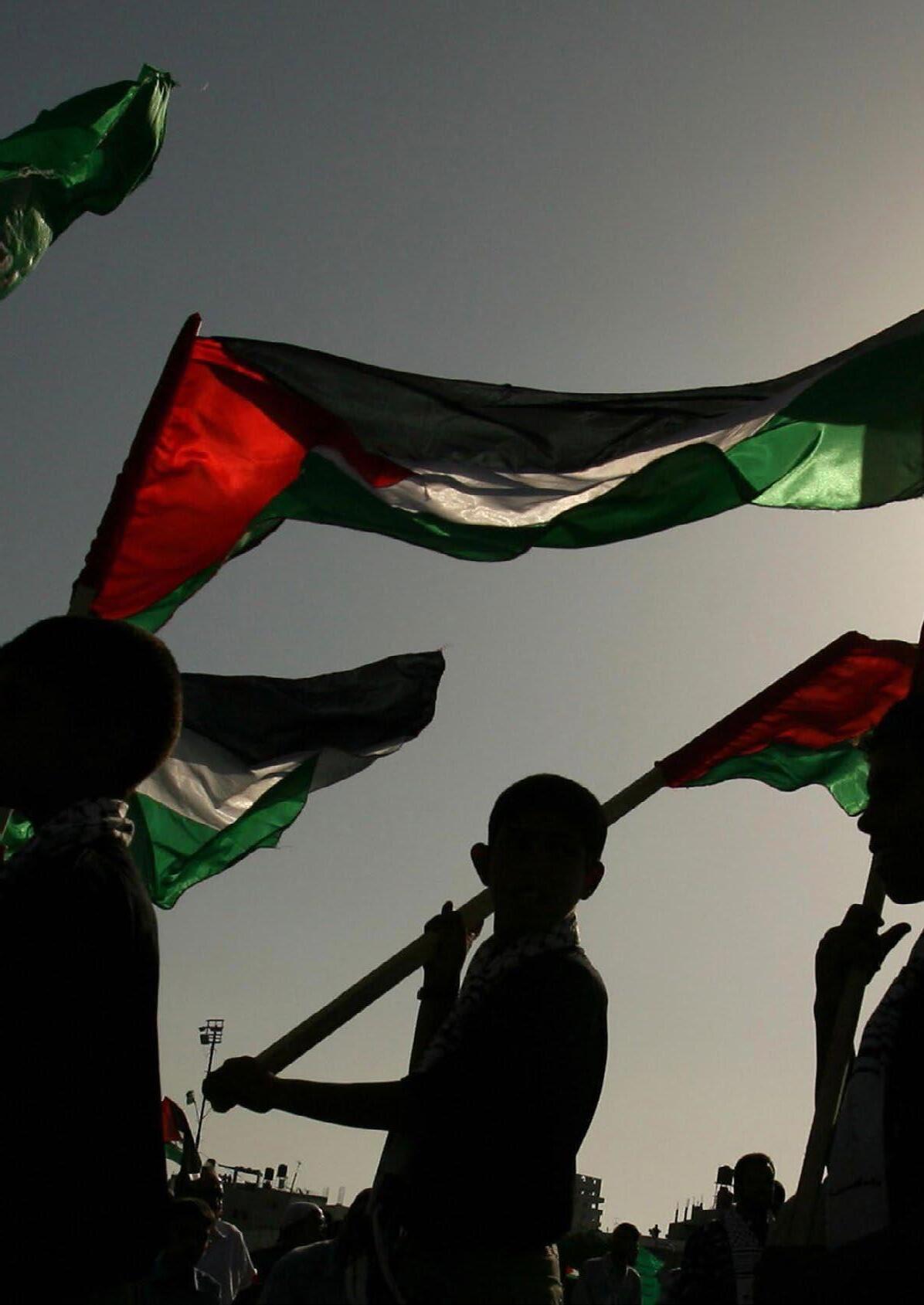
and bitterness in difficult times. Though it takes time to develop a habit, yet it’s up to you whether you see the glass half-filled or half-empty.
Nevertheless, once we have gone through the chaos, we would grow stronger, purified, and closer to Allah Subhana hu Wata’la. Let’s learn how we can implant our lives with satisfying Islamic teachings in times of turmoil.
Everyone experiences, less or more, mayhems and hardships in life. At times it’s very hard to be resolute and persistent

in faiths when calamities strike.
However, that would be the right time to reconnect to Allah Subhana hu Wata’la. Be steadfast in the faith because Allah Subhana hu Wata’la will test your creed if you are a believer, as He informs:
“Dopeoplethinkthey will be left alone after saying ‘We believe’ without being put to the test?”
(29:2)
Believe in Allah’s Planning
Remember, a turmoil is not always a test, rather a pathway toward the better alternative. With our limited visions, we aren’t able to judge upcoming alternatives.
Therefore, we must believe that Allah Subhana hu Wata’la has a good plan for us. So, never give in and continue the struggle with the hope of an improved tomorrow. As Allah

Subhana hu Wata’la says:
“You may dislike something although it is good for you, or like something, although itisbadforyou” (2:216)
(Fate)
Often, we over-think the situations instead of analyzing our behaviors and attitudes. Instead, we must consider our actions and improve them if needed.
Though it is the basic element of our belief that all the pros and cons are from Allah Subhana hu Wata’la, yet personal responsibility plays an important role. So, this real perspective of Qadr (fate) every Muslim must bear in mind, as Allah Almighty says:
“Indeed,Allahwillnotchangethecondition of a people until they change what is in themselves.”
(Al-Ra’ad:11)
On the other hand, we do not have control over certain things: the birth and death, the weather, the gender of our children, the fate of our siblings, and the source of income -to name a few. In this case, believers must keep faith in fate by Allah Subhana hu Wata’la.
“Birds of a feather flock together”: a wise maxim sound. Verily, peer pressure can make or break the way to success. So, surround yourself with the people who are most likely to influence you virtuously.
The Holy Prophet (PBUH) has elaborated this fact with the metaphor of the blacksmith and perfume seller:
“Theexampleofagoodcompanion(friend) incomparisonwithabadoneislikethatof onewhosellsmuskandtheblacksmith. From thefirst,youwouldeitherbuymuskorenjoy its good smell, while from the blacksmith youwouldeithergetburnedorsmellabad scent.”
(SahihBukhari)
Positive people will not only give you a helping hand in critical situations but also keep inspiring you living a healthier and positive life. So, keep negative people at arm’s length and join the pious company, somehow.
Remember that there is always a light at the end of a dark tunnel. Also, stars twinkle in the nights. So, there is nothing to worry about. Just raise your head with hope and fill your heart with confidence as Allah Subhana hu Wata’la also says:
“Verily, with every hardship comes ease” (94:5)
So, we should keep in mind that hardships are always followed by relief and all the patience will pay off one day. Allah Subhana hu Wata’la doesn’t fissure His promises. All you need is to have trust in your Almighty Creator. However, one must never forget to thank Allah when things get better.
First and foremost, the best way to deal with hardships is to seek His refuge. Indeed, Allah almighty listens to His men and relief their sorrows. So, believers must carry on offering prayers, fasting, and remembering Allah sitting or standing, in all situations.
All the Apostles and Prophets were used to make “Dua” whenever they found themselves in turmoil. For example; when in the belly of fish, the Prophet Yunus realized his mistake, he called out to Allah:
“… he cried through the depths of darkness (saying):
“ThereisnoGodbutYou,GlorifiedbeYou! Truly,Ihavebeenofthewrongdoers.” (21:87)
However, the prolongation of turmoil doesn’t mean that the prays are wasted. Verily, all your good deeds are chronicled and rewarded, sooner or later. Remembering Allah Almighty will give you enough zeal to face the hardships manly.
Hardships and turmoil are an inevitable part of our life. So, we have to face them and try to overcome chaos gracefully.
Being a good believer, we must keep faith in Allah Subhana hu Wata’la no matter how worse the situation becomes. Also, remember, it’s our behavior, not the magnitude of hardship, that determines the fate. So, be hopeful and complement and go through the difficulties gracefully.

 By Zainab Fadeel Mohamed
By Zainab Fadeel Mohamed






‘Ammar ibn Yasir, may Allah be pleased with him, said: Whoever has three qualities will have completed the faith: fairness from yourself to others, offering peace to the world, and spending in charity even while poor.
Source: Musannaf Ibn Abī Shaybah 30440, Grade: Sahih














Muhallebi recipe is a classic Middle Eastern milk pudding, one of the easiest light refreshing delicious desserts to prepare. Made with only a handful of ingredients, milk, sugar, and corn starch, combined in a few simple steps to create a smooth pudding-like dessert.
• 4 cups of milk
• ½ cup of sugar
• ½ cup of corn starch
• 1 teaspoon of orange blossom water or rose water.
• Ground pistachios or almonds for garnish
1. In a separate bowl, take one cup of milk and dissolve the corn starch, whisk well creating a smooth paste.
2. In a saucepan, combine the milk and sugar over medium heat. Stir occasionally until the mixture is heated but not boiling.
3. Slowly pour the cornstarch mixture into the saucepan while stirring continuously to prevent lumps from forming.
4. Continue stirring the mixture over medium-low heat, until it thickens to a custard-like consistency. This process may take about 10-15 minutes.
5. Once the muhallebi has thickened, remove it from the heat and add the orange blossom water or rose water. Stir well to incorporate the flavor.
6. Pour the muhallebi into individual serving bowls or a large serving dish. Let it cool to room temperature, and then refrigerate for at least 2-3 hours until it sets completely.
7. Before serving, garnish the muhallebi with ground pistachios or almonds for added flavor and presentation.

This Mutabal recipe which is also known as baba ghanoush, is a Palestinian eggplant dip made with a delicious smoky flavor of roasted eggplant, mixed with tahini paste, garlic, fresh lemon juice, and salt.
Ingredients
• 1 large eggplants
• ¼ cup tahini sauce
• 1-2 fresh lemon juice (adjust to taste)
• 1-2 garlic cloves crushed.
• ¼ teaspoon sea salt (adjust to taste)
Instructions
1. Cut a few slits in eggplant then place it either on top of gas stove or on a baking sheet under the broiler for about 30-40 minutes.
2. Flip to the other side for another 15 minutes and until the eggplants look very soft inside.
3. Peel skin once it’s cooled off.
4. Mash eggplants with a fork or a potato masher.
5. Add tahini paste, crushed garlic, lemon juice, and salt and mix everything well together.
6. Drizzle some extra virgin olive, garnish with pomegranate seeds and parsley.
Whether eggplants are roasted in the oven, gas stove top, or charcoal grill, make sure that the inside is very soft.
If you’d like to store grilled eggplant before mixing, add lemon juice which would prevent it from getting a darker color.If
Musakhan rolls are a delightful variation of the classic traditional Palestinian dish, Musakhan. A delicious flavor of chicken mixed with caramelized onions cooked in extra virgin olive oil and lots of sumac spice, then all wrapped in a thin flat bread into small rolls.
Ingredients
Onion Mixture
• 2-3 large red onions
• ½ cup of extra virgin olive oil
• ½ teaspoon of sea salt
• 1 tablespoon of sumac
• ¼ cup of toasted pine nuts or almonds
For Chicken
• 1 tablespoon olive oil
• 2 breast chicken
• 1 teaspoon sea salt
• 1 teaspoon allspice
• ¼ teaspoon cinnamon
• ¼ teaspoon black pepper
• Juice of one lemon
For Wrapping
• 5 flour tortillas cut into 4 pieces.
• 1 tablespoon of extra virgin olive oil to grease baking sheet and brush rolls.
Instructions
1. Chop onions finely and add in a pot over heated olive oil.
2. Cook over medium-high heat while sautéing until onions are soft and caramelized, about 10-15 minutes. Then season with salt, black pepper, and sumac.
3. Meanwhile, slice chicken into small pieces, add salt, lemon juice, and spices and mix well.
4. In a large skillet heat oil over highmedium heat and cook chicken.
5. Once chicken is cooked pour over the onion mixture and integrate everything well together. Adjust taste by adding salt and extra sumac if needed.
6. Add toasted pine nuts over the mixture.
7. Prepare tortillas for stuffing: with a


knife or a pizza cutter cut each tortilla into four triangle pieces.
8. Place one tablespoon of musakhan stuffing on the top of the triangle, tuck in the sides then roll over the filling to create a roll.
9. Place the rolls seam side on a baking tray and continue the process until all filling is done.
10. Brush the tops of the rolls with some olive oil and sprinkle with sumac, then bake on a preheated 400 oven for 15-20 minutes or until they’re golden brown and crispy.
MIN
You can use any leftover chicken with this recipe, shredded and add it over cooked onions with olive oil and sumac, then wrap with pita bread.
These rolls can work well to pre-make and store unbaked in the freezer for future parties or family gatherings.
This cheese manakeesh recipe is a popular Palestinian flatbread topped with akkawi cheese and has a gooey savory flavor. It is perfect for breakfast or a snack and can be enjoyed with a cup of tea and/or some sliced cucumbers and tomatoes.

Ingredients
• 2 ½ cups flour and 2-3 tablespoons extra if needed
• 1 cup warm water
• ½ teaspoon sea salt (use up to 1 teaspoon only if triple this recipe)
• 1 teaspoon sugar (use one 1 teaspoon only with double or triple this recipe)
• 1 tablespoon yeast (use one 1 tablespoon only with double or triple this recipe)
• ¼ cup olive oil and 1 tablespoon for greasing the baking sheet
• 12 ounces (about 1 and ½ cups) akkawi cheese shredded
• 1-2 tablespoons of nigella seeds (optional)
Akkawi cheese is more of a salty cheese, I recommend soaking the cheese in hot water for 10-15 minutes before using it to get rid of the extra salt. Then rinse the water and shred the cheese.
Tap each dough piece after flattening with the tips of your fingers or with a fork before adding the cheese that will prevent the dough from over puffing.
20 MIN
Instructions
1. In a small bowl, combine ½ cup of warm water, sugar, and active dry yeast. Let it sit for about 2-3 minutes until it becomes frothy.
2. In a large mixing bowl, combine 1 and ½ cups of flour and salt. Then pour in the yeast mixture with the remainder of the water. With a utility whisk or a stand mixer, combine the mix well, then cover with plastic wrap and a kitchen towel, and let it sit for 10 minutes.
3.
4. Add the rest of the flour and oil to the mixture and then knead on a floured surface or in the mixing bowl for about 5-7 minutes until the dough is smooth and elastic. With your hands rub the bowl and the dough with a few drops of oil, cover it with a cloth and a blanket, and let the dough rise in a warm place for about 30 minutes.
5. Preheat your oven to 420°F.
6. Divide the dough into smaller balls (about golf ball size).
7. With your hands or a dough roller flatten each ball into a flat disc (about ¼ inch thick) and place on a greased baking pan.
8. Spread akkawi shredded cheese over each piece and sprinkle some nigella seeds on top.
9. Continue the process until all flattened dough pieces are filled.
10. Bake in a preheated oven for about 12-15 minutes or until the bottom and edges are golden brown and the cheese is melted.
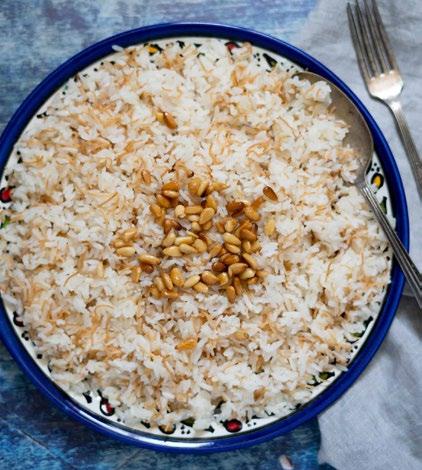
An traditional and easy recipe of how to make Arabic Rice with Vermicelli, three ingredients only. Served as a side dish next to many Middle Eastern stews.
Ingredients
1 cup short-grain white rice.
1 tablespoon ghee (butter or any oil)
⅓ cup vermicelli
1 cup of boiled water
¼ teaspoon sea salt
Directions
Soak rice for about 10-15 minutes. In a cooking pot, heat oil or butter, add vermicelli and continually steer until all evenly roasted, until turning golden brown.
Rinse rice from water, pour over vermicelli, add salt, and continue to stir so that the rice is well-coated with ghee and vermicelli.
Add boiled water, once it starts boiling, cover the pot and turn the heat low.
Let it cook for about 15 minutes. Turn heat off and let it sit for 10 minutes and then fluff it with a fork.

Ingredients
1 cup Ghee (clarified butter)
1 cup confectioner sugar
2.5-3 cups all-purpose flour
1 tablespoon orange blossom water
½ cup raw pistachios
Directions
Preheat oven to 325 degrees F. Add softened ghee to a stand or hand mixer, and whip on high speed until fluffy. Gradually add confectioner sugar (sifted) and orange blossom water mix on a low speed until fully combined.
Slowly add 2.5 cups of all-purpose flour (sifted) and mix on a low speed until everything is well combined. Integrate everything well together until you form a dough. If the dough looks too soft you can gradually add the remainder ½ cup of flour 1 tablespoon at a time.
Use your hands to bring the dough together. Start forming small pieces, with your hands roll them into a long log, cut in about 1 finger size, then slightly shape into the letter S. Another option can be by simply making a small round ball, and flattening it between your palms. Press the middle of the cookie gently with your thumb to form a small indent to add a pistachio on top.
Continue until all the dough is done. Place cookies on a baking tray, no need to grease and bake for 12-15 minutes. Cookies will remain pale and not browned.








Chicken Fatteh is a delicious recipe that consists of layers of bread soaked in chicken broth flavored with garlic and lemon juice, then topped off with rice, tender chicken, and sprinkled with crunchy toasted almonds and pine nuts.
Ingredients
• 2 breast chicken with bones
• 3-4 cups of tap water
• 2 cardamom seeds
• 1 stick cinnamon
• 2 bay leaves
• 1 cup rice
• 1-2 flatbread lightly toasted and cut into small pieces
• 4-5 cloves of garlic
• 2-3 juice of fresh lemons
• ½ sea salt
• ¼ cup toasted pine nuts and/or almonds
Instructions
To cook the chicken:
1. In a medium pot, cover chicken with water until submerged about 3-4 cups tap water. Add bay leaves, cinnamon sticks, and cardamom seeds.
2. Once it starts boiling remove any extra foam on top, and let it boil on medium heat for 20-30 minutes and until the chicken is fully cooked.
3. Let chicken cool until it’s safe to touch, remove bones, and shred chicken into small pieces.
4. Meanwhile, cook the rice separately.
To make rice:
1. Soak 1 cup of rice for about 10 minutes, then drain and rinse.
2. In a saucepan, heat 1 tablespoon of oil or butter, add rice, and ¼ teaspoon of salt, then add 1 cup of boiled water, and stir it.
3. Cover, and reduce heat to low, let it simmer for about 10-15 minutes.


PREPARATION COOKING METHOD 15 MIN 30 MIN Stove
To assemble:
1. Cut bread into bite-sized pieces and lightly toast them.
2. Pour chicken broth, crushed garlic, lemon juice, and salt over bread.
3. Mix everything well and layer at the bottom of a platter.
4. Layer rice on top of the bread, then spread the shredded chicken on top of the rice.
5. Sprinkle toasted almonds and pine nuts.
NOTES
While you can prepare all the ingredients ahead of time, it’s best to layer everything just before serving.
Make sure chicken broth is hot, bread needs to be soaked and not crunchy with this recipe.

In collaboration with Life Without School https://lifewithoutschool.co.uk/



